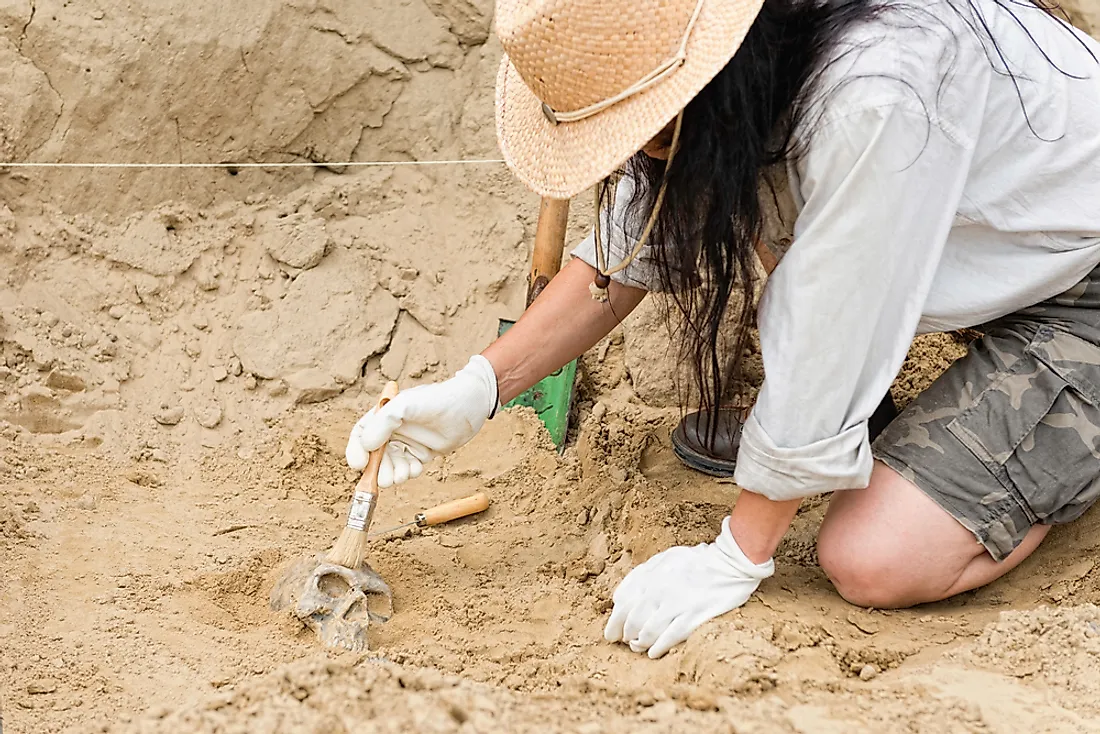What Does an Archaeologist Do?

An archaeologist studies, analyses, and recovers recent and prehistoric human past through observable physical material remains of the past in a quest to enable a wider and comprehensive understanding of human culture. The discipline of archeology is a branch of anthropology. The material remains include artifacts, architecture, biofacts (ecofacts), and landscapes. Goals of an archaeologist include understanding cultural history, constructing past ways of living, documenting human history, and explaining the changes in human societies over time. Archaeologists are important because they help us understand the over 99% of unrecorded human past, their societies, and how they evolved physically and their inventions over time.
Types of Archaeologists
The common characteristic of all archaeologists is that they are involved in surveying, data collection, analysis, and interpretation. Archaeologists borrow techniques from other disciplines such as anthropology, history, art history, classics, ethnology, geography, geology, linguistics, semiology, physics, information sciences, computational archaeology (also known as digital archaeology), archaeogaming, chemistry, statistics, paleoecology, paleontology, paleozoology, paleoethnobotany, and paleobotany. The discipline of archaeology is diverse, and there are some archaeologists who specialize in specific fields. They include historical archaeologists, ethnoarchaeology, experimental archaeologists, archaeometry, feminist archaeologists, rescue archaeologists, maritime archaeologists, and much more. Historical archaeologists study cultures through writing while Ethnoarchaeology is the ethnographic study of existing persons intended to help in understanding of archaeological records. Experimental archaeologists usually use experimentation to come up with the concrete controlled observation of processes that create and impact the archaeological record. Archaeometry use application of physics, chemistry, and engineering to systemize archaeological measurements. Pseudo-archaeologists are individuals who call themselves archaeologists but violate the normally accepted and scientific archaeological ethics.
Challenges Archaeologists Face
The rise of pseudo-archeologists has watered down the quality and credibility of archeological works. Looting and destruction of archeological sites has been on the rise. Looting may happen when interested parties loot the artifacts to sell, or locals who feel attached to the artifacts steal them. Some locals also consider archaeologists who come to their ancestral homes and carry culturally and religiously significant materials as thieves. The archeologists view the past as linear (the past is long gone) while natives view it as cyclic (disturbing the past is a bad omen). In such a scenario, the academic comes into conflict with the need to respect the past.
History of Archaeologists
An Italian Renaissance human historian Flavio Biondo is the earliest known archaeologist. He wrote a guide on the ruins and topography of earlier Rome in the early 15th century. Early archeologists were called antiquarians in the 17th and 18th centuries whose studies only concentrated on the history of historical sites, manuscripts, and ancient artifacts (antiquarianism). They focused on observable evidence to understand the past. Some of these antiquarians surveyed and explained the English countryside, drawings, and monuments. Also studied by the mid-18th century were the evolutions of handwritten text, utensils, shield-shapes, architecture, and different types of costumes among others. During this period, specialized excavations like stratification were not used. By the early 19th century, William Cunnington (the father of archaeological excavations) developed most of the terms and procedures used by archaeologists to date including stratigraphy (each overlapping strata trace back to a successive period in chronological order). By the 1920s, Sir Mortimer Wheeler developed the grid system of excavation. Most universities also started offering archaeology programs during this time. Today, almost all archaeologists are university graduates.
Future of Archaeology
Presently, archaeologists learn and share about past human societies and the lives they led over 2.5 million years ago. Archaeology brings to light many of humanity’s technological advancements, tools development, metallurgy, the rise of cities, religion, and agriculture among others. Archeologists provide the only available means of learning and understanding the existence and behaviors of the past societies of people. As a developing area of study, modern archaeologists use specialized computer programs and techniques to measure and come up with conclusions. This area of study is evidently evolving, and more sub-discipline of archaeology are expected in subsequent years as well as more concrete explanations of findings.











